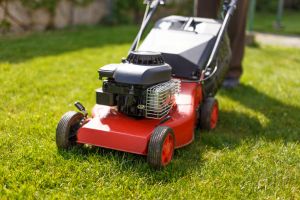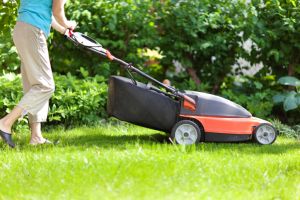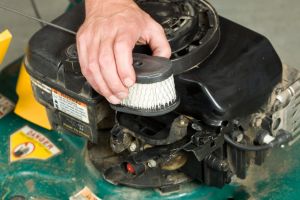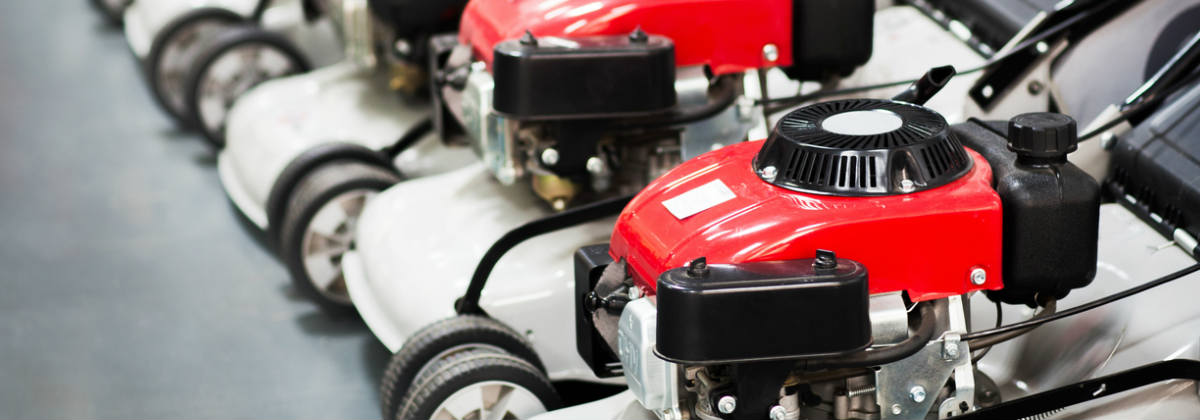Mowing the lawn on a Sunday is a sacred tradition, but while suburban lots have become tighter and houses bigger, mowing is still a necessary chore among many Australians. If your trusty old mower has carked it and you’re looking for a new lawn mower, you’ve probably debated the pros and cons of an electric mower, as well as how it stacks up against the traditional petrol mower. But which one should you really be kickstarting? Canstar Blue breaks down the key differences between the two to help you find out which one will make the cut.
Petrol Vs. Electric Lawn Mowers

While a petrol and electric lawn mower both give you the same end result, are there enough differences to warrant a closer look? The short answer is yes, although the overarching influence will be the size of your lawn and what your mowing habits are. The main areas to consider between electric and petrol lawn mowers include:
- Power output
- Pollutant output
- Usability
- Maintenance
- Fuel
- Price
Power Output
How much power your lawn mower has will directly influence how it gets through the lawn. If you have more power at your fingertips, the more unruly the lawn you can tackle (within reason of course). Petrol mowers are traditionally the more powerful option, with most petrol mowers equipped with engine sizes of around 200cc, which are generally capable of 7nm of torque, meaning you can usually give your suburban lawn a pretty good haircut.
On the other hand, electric lawn mowers aren’t slouches when it comes to power, but aren’t as powerful as petrol mowers. Suitable for smaller blocks, electric lawn mowers will have a smaller output, but can still pack enough of a punch to help you get the job done.
- Verdict: Petrol mowers are the heftier option of the two, but you’ll only be able to really take advantage of the additional muscle if you’ve got a but of lawn to cut.
Pollutant Output
You may love the smell of burning petrol in the morning, but your neighbours might not, particularly if you’re rip the cord early Saturday morning. Due to the engine, petrol mowers operate louder to electric models, with a noise output of around 90Db – compared to an electric model’s output of around 75Db – as well as produce more emissions, meaning petrol models aren’t as good for the environment either.
However, Australia introduced new legislation and emissions standards in 2019, meaning that while not as bad as they once were, petrol mowers will likely have a higher emissions output than an electric model, meaning if you’re a bit more environmentally conscious (or are just a considerate neighbour), an electric model may be your best fit.
- Verdict: Electric models are the better option if you’re looking for a quieter operation, and generally don’t have as much as an environmental impact as petrol models.
Usability
How useable a mower is relies on a lot of factors, from the physical size of the mower, the size of the wheels attached, if you’re operating with a catcher attached, and the terrain you’re working with. As mentioned, petrol mowers are generally more powerful, but the useability of your mower generally comes down to the individual model in question, rather than what powers your motor. Several things you will have to consider with an electric mower are:
- Is it corded or cordless? Corded mowers obviously provide endless run time, but you are limited by how far the extension cord goes, and how many outdoor power points you have.
- Cordless mowers are obviously unbound by cords, but may feature limited run times of an hour or less, making a second battery necessary if tackling anything more than a small lawn. Charging these batteries can also take some time, meaning you’ll have to plan ahead to make sure you’re firing on all cylinders.
Aside from that, deck size also has a hand in useability. Deck size simply refers to how wide the lawn mower cuts, with electric models generally smaller. Electric mowers are also generally lighter than petrol ones, for the simple fact they don’t have a mechanical engine on-board, making them more manoeuvrable and usable.
- Verdict: While how manoeuvrable your mower needs to be will depend on the terrain and how many obstacles you have in your garden, electric models are traditionally smaller and lighter, making them easy to take up and down the lawn.
Maintenance

No matter your mower, they all require some degree of maintenance, but a petrol mower with its mechanical engine may require more maintenance than an electric one. Both electric and petrol mowers require maintaining, sharpening and oiling the blades, but petrol mowers – like cars – also require extra servicing in the form of spark plugs, oil, air and fuel filters.
- Verdict: While all mowers will need a bit of maintenance and servicing every few years, as an electric model has less engine parts, it does make for an easier mower to maintain, provided you take care of it!
Fuel
Like a car, you’ll have to ensure that you’ve got something in the tank before you set off, as you don’t want to be running out of juice before the job is done. Petrol models are (surprisingly) fuelled by petrol, with 4-stroke engines generally taking unleaded petrol, although you’ll have to read your mower’s manual to ensure you’re putting in the right fuel. The downside of this is that you’ll have to fill up at the petrol station, and with petrol prices fluctuating seemingly every week, cutting the grass can quickly rack up a decent amount of fuel costs.
Electric mowers on the other hand simply use electricity to get moving, and as either the mower itself is plugged into a power point, or you plug in the battery unit to be charged, you’ll be using your house’s electricity to power your mower. As a result, electric mowers are a bit easier to power, provided you’ve charged the battery!
- Verdict: Electric mowers may get the point for convenience, but filling up a jerry can the next time you fill up the car isn’t exactly a hard slog. However, you may also want to keep an eye on your electricity bill, particular if you’re mowing regular, as you may find a surprise on your next energy bill.
Read more: Electric Mower Running Costs
Price
Once again this more comes down to the individual model in question, but electric mowers generally have a cheaper entry price than petrol variants. However, as a general rule, electric mowers are more suited to suburban lawns with their smaller cutting widths and less powerful motors, and as such tend to be a bit cheaper than petrol variants. As a result, it may be worth shelling out more for a more powerful model if you’ve got plenty of lawn to get through.
- Verdict: Electric models are generally cheaper, but you may be wishing you purchased a more expensive mower if you’re setting aside a whole day to get the lawn looking good.
Should I get an electric or petrol lawn mower?
It all comes down to your yard and your preferences. For most modern suburban blocks with a small yard, an electric mower is probably ‘good enough’. Electric mowers benefit from quieter operation and having no emissions, and are also commonly found for cheaper than petrol mowers. However, where petrol mowers win out is their sheer ability to just get the job done. They often feature more powerful motors, with leading torque figures and cutting widths. For those living on older, bigger blocks or semi-rurally, a petrol lawn mower is probably still king. In any case, one isn’t necessarily ‘better’ than the other, but they each have their strengths and weaknesses and suit different needs and lawns, meaning it’s best to do your research before cutting into your bank account.
Original Author: Harrison Astbury


Share this article